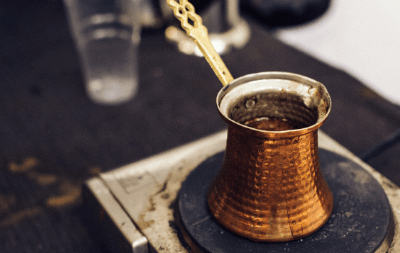
The first time I tried Turkish coffee I was surprised to see so many loose coffee grounds at the bottom of my mug. I was curious if this was a typical practice for Turkish coffee, so I did some research. Here’s what I discovered.
Is Turkish coffee filtered? No, Turkish coffee is not filtered. The grounds, coffee and foam are all poured from the Ibrik directly into a mug. Most people do not drink the grounds and they are so finely ground that you won’t unintentionally drink them when taking sips.
Here’s what else I learned about why traditional Turkish coffee is not filtered. Also, some tips and ideas for filtering Turkish coffee if you don’t enjoy the loose grounds.
Why Turkish coffee is not filtered
Turkish coffee is a style of coffee that’s intentionally prepared without a filtering step. Finely ground coffee beans are brewed with sugar and cardamom in an open vessel with water.
Unlike the French Press method for preparing coffee, where the plunger filters out loose ground sediment before pouring, Turkish coffee involves pouring everything directly into your mug.
When I prepare Turkish coffee I never notice the grounds being an issue in my mug. They tend to stay at the bottom and don’t stir up when taking sips.
I think this is because this style of coffee calls for ultra-fine coffee grounds. These grounds tend to stick together and remain at the bottom of my mug instead of floating around.
Why you should not filter Turkish coffee
Filtering Turkish coffee will destroy its foam
Filtering Turkish coffee will destroy its foam, which is the beverage’s most famous characteristic. As a result, you won’t get the full Turkish coffee experience.
Filtering the grounds will alter the taste of the Turkish brew
The loose, unfiltered grounds will continue to extract flavor and caffeine into your beverage as you drink it. Filtering them out will prevent you from enjoying an authentic Turkish coffee experience.
With that being said, you should choose to brew your coffee in whatever way you enjoy it most.
Filtering adds more time to an already long brewing process
Filtering requires another piece of equipment and adds a little extra time on top of what is one of the more time-intensive coffee-making processes. This probably isn’t a deal breaker if filtering is important to you, but it’s worth mentioning.
Can you filter Turkish coffee?
Yes! It’s certainly possible to filter Turkish coffee. However, each filtering method has its drawbacks. Here are a couple methods you could try.
Filter using a metal strainer
The first option is to try filtering the grounds out using a metal strainer or mesh filter. Simply pour from your Ibrik through the filter and into your mug.
The advantage with this filtering method is that the metal will not absorb any of the coffee oils, keeping a lot of the flavor profile and body intact. The drawback is that your filter might not be fine enough to filter out the coffee grounds.
Turkish coffee is traditionally made using ultra-fine grounds, which might make a metal strainer an unsuitable filtering option.
Filter using a paper filter
Another option is to try a paper filter. The downside to this method is that you risk absorbing some of the oils that add delicious flavor and body to the beverage. Also, this will almost certainly remove all of the foam which adds to the coffee’s texture and is one of the main characteristics of Turkish coffee.
How to prevent the need to filter Tuskish coffee
If you want to get the Turkish coffee experience without using a filter, here are a couple things to consider trying.
Don’t stir your Ibrik
Many Turkish coffee recipes will call for you to stir the coffee while it’s brewing. This will cause your grounds to float freely throughout the Ibrik and might increase the amount of loose grounds in your final beverage.
To solve this, consider not stirring your coffee at all while it is brewing. In fact, many traditional Turkish coffee brewers suggest that this is the correct way to make the beverage anyways.
Instead of stirring, you simply let the sugar, coffee grounds and cardamom dissolve in the water and let the Ibrik do the rest of the work for you.
Let your grounds settle before pouring
Once your Turkish coffee is finished brewing, slowly and carefully remove it from the heat and place it gently on another part of your stove to rest for a moment.
This will cause the loose grounds to settle down to the bottom of the Ibrik. This may reduce some of the loose grounds that get poured into the final beverage.
Slowly pour from your Ibrik into your mug
When you’re ready to transfer your Turkish coffee from the Ibrik to your mug, focus on pouring it very slowly so you don’t stir up the loose grounds at the bottom. If you’re careful, you can filter out some of the loose grounds without the need for a secondary filter.
Try another style of coffee
Unfortunately, as you can see, there aren’t many great options for filtering Turkish coffee. If loose grounds are something that you simply don’t enjoy, consider trying one of the many other great coffee beverages that are filtered.
I would not recommend immersion style coffee because they will often have loose sediment as well, even if there is a filtering step. The most popular immersion coffee is French Press.
I would recommend trying drip style coffee because they involve using filters right off the bat. Some popular drip coffees include Chemex and pour over.



